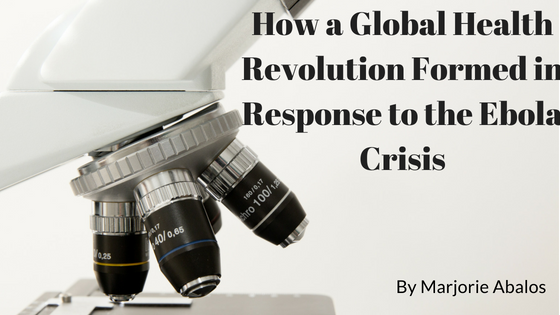Ebola is a disease that is infectious and, more often than not, fatal. It is marked by severe internal bleeding and fever and can be spread through contact with body fluids of those who have been infected. First, Ebola strikes the immune system, then attacks all of the body’s vital organs, resulting in extreme internal hemorrhaging. The Ebola virus was first discovered near the Ebola River in the country that is now referred to as the Democratic Republic of Congo, in 1976.
On August 4, 2014, the Sierra Leone government ordered over 7 million citizens to seek shelter at home and pray in response to the Ebola epidemic that had broken out. The government implemented temperature checks for people at roadblocks, set up isolation wards, and even instated emergency burial team. Desperate times called for desperate measures, and even after these measures were taken the disease still went on to claim over 11,000 lives. The government and world did not have the research to successfully combat this disease before it became an epidemic.
This May, however, there has been an outbreak of the virus in the Democratic Republic of Congo, yet for the first time, global health experts were optimistic. After the last epidemic, they developed an experimental vaccine and were empowered by a global health security revolution, perhaps giving them a chance to combat Ebola.
Peter Piot, the director of the London School of Hygiene and Tropical Medicine, helped identify multiple strains of the Ebola Virus and worked with a team of scientists to investigate the outbreak. This team was effective in stopping the outbreak in Yambuku; their methods included tracing those who had been in contact with suspected cases and isolated those showing any symptoms. We were finally starting to make successful steps toward working toward eradicating the Ebola Virus, with optimism for the first time in 40 years.
The world’s attention was keyed in on this deadly virus because of the outbreak, but only after American Ebola patients first started showing up. This signaled that Ebola was a global pandemic, and thus needed to be met with global action and efforts. This resulted in testing an experimental Ebola vaccine developed by Canadian scientists, which was found extremely effective.
Finally, Ebola was being combated on the global level that it deserved to be, at last providing some closure and hope to Ebola patients and their families. It changed the way that the world deals with epidemics, particularly by serving as a retrospective model of how countries working together on a global level are more likely to solve a health crisis than just individual nations or institutions.

